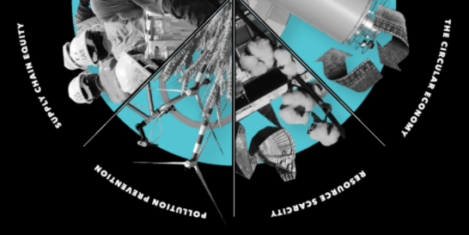To provide the best experiences, we use technologies like cookies to store and/or access device information. Consenting to these technologies will allow us to process data such as browsing behaviour or unique IDs on this site. Not consenting or withdrawing consent, may adversely affect certain features and functions.
The technical storage or access is strictly necessary for the legitimate purpose of enabling the use of a specific service explicitly requested by the subscriber or user, or for the sole purpose of carrying out the transmission of a communication over an electronic communications network.
The technical storage or access is necessary for the legitimate purpose of storing preferences that are not requested by the subscriber or user.
The technical storage or access that is used exclusively for statistical purposes.
The technical storage or access that is used exclusively for anonymous statistical purposes. Without a subpoena, voluntary compliance on the part of your Internet Service Provider, or additional records from a third party, information stored or retrieved for this purpose alone cannot usually be used to identify you.
The technical storage or access is required to create user profiles to send advertising, or to track the user on a website or across several websites for similar marketing purposes.
 A new in-depth report by HR and payroll software providers, Natural HR highlights the trends, challenges and priorities facing the HR profession, and the impact of the pandemic. In 2019, the top priority of HR leaders was cited as recruitment and retention, however by the end of 2020 this had shifted to employee health and wellbeing. More →
A new in-depth report by HR and payroll software providers, Natural HR highlights the trends, challenges and priorities facing the HR profession, and the impact of the pandemic. In 2019, the top priority of HR leaders was cited as recruitment and retention, however by the end of 2020 this had shifted to employee health and wellbeing. More →





 Originally published in December 2014. Homeworking seems to have become a bit of a hot topic this year, but one sentence published on the
Originally published in December 2014. Homeworking seems to have become a bit of a hot topic this year, but one sentence published on the 
 Senior executives aged 55+ have fared better than ‘millennial’ leaders (aged under 35) during the global pandemic.
Senior executives aged 55+ have fared better than ‘millennial’ leaders (aged under 35) during the global pandemic. 
 Workers in Britain are facing inequality due to a stark difference in employers’ approaches to flexible working, with nearly half (46 percent) of employees saying they do not have flexible working arrangements – such as flexi-time, part-time working, compressed hours or job shares – in their current role. This is according to new research from the
Workers in Britain are facing inequality due to a stark difference in employers’ approaches to flexible working, with nearly half (46 percent) of employees saying they do not have flexible working arrangements – such as flexi-time, part-time working, compressed hours or job shares – in their current role. This is according to new research from the 
 Last year, many organisations were forced overnight to adjust to new ways of working. Digital transformation accelerated, and collaborative activities were recreated virtually. But while teams have adapted functionally to maintain productivity, organisational leaders need to pay special attention to the “intangible” cultural aspects and their overall purpose.
Last year, many organisations were forced overnight to adjust to new ways of working. Digital transformation accelerated, and collaborative activities were recreated virtually. But while teams have adapted functionally to maintain productivity, organisational leaders need to pay special attention to the “intangible” cultural aspects and their overall purpose. 
 The greater stress companies put on financial incentives and financial performance in bonus systems for CEOs, the more negative the impact is on the firm’s financial performance, claims new research from
The greater stress companies put on financial incentives and financial performance in bonus systems for CEOs, the more negative the impact is on the firm’s financial performance, claims new research from 
 BlackRock is one of the largest asset management companies on the planet. Each year, at the start of January, the CEO Larry Fink writes a letter addressed to the other CEOs of the world. In his New Year’s letter for 2020, Fink appealed in particular to his fellow CEOs’ sense of social responsibility. In particular, he focused in on the risks faced by the climate. “Climate risk is an investment risk,” and he called on all companies, both public and private, to create greater societal added value. “Society is looking increasingly to companies to solve social and economic problems,” he concludes, so asset managers should be encouraged to invest in companies with a ‘purpose’.
BlackRock is one of the largest asset management companies on the planet. Each year, at the start of January, the CEO Larry Fink writes a letter addressed to the other CEOs of the world. In his New Year’s letter for 2020, Fink appealed in particular to his fellow CEOs’ sense of social responsibility. In particular, he focused in on the risks faced by the climate. “Climate risk is an investment risk,” and he called on all companies, both public and private, to create greater societal added value. “Society is looking increasingly to companies to solve social and economic problems,” he concludes, so asset managers should be encouraged to invest in companies with a ‘purpose’. 
 As the world prepares to close the book on the unprecedented events of 2020 and looks ahead to 2021 with renewed hope and optimism, global research from
As the world prepares to close the book on the unprecedented events of 2020 and looks ahead to 2021 with renewed hope and optimism, global research from 
 The number of companies monitoring their employees is growing. According to a Gartner survey, more than 22 percent of employees use employee movement data, while 17 percent of them are monitoring computer usage. With companies choosing to monitor employees, privacy laws are also catching up, and thus there is a need for explaining employee monitoring to prospective hires. Employee monitoring is defined as the use of monitoring devices and methods by companies to learn about their employees’
The number of companies monitoring their employees is growing. According to a Gartner survey, more than 22 percent of employees use employee movement data, while 17 percent of them are monitoring computer usage. With companies choosing to monitor employees, privacy laws are also catching up, and thus there is a need for explaining employee monitoring to prospective hires. Employee monitoring is defined as the use of monitoring devices and methods by companies to learn about their employees’ 
 Companies are facing complex performance challenges as the COVID-19 resurgence heightens the need to reinvigorate employee engagement.
Companies are facing complex performance challenges as the COVID-19 resurgence heightens the need to reinvigorate employee engagement. 











April 1, 2021
Finding a new sense of purpose in the way we all do business
by David Lineen • Comment, Environment, Property, Wellbeing